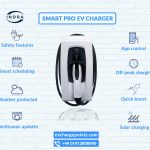
Electric cars face two key problems: range and charging infrastructure. Electric car ranges are getting longer as technology develops and both the government and private companies are spending millions on improving charging facilities in the UK. However, for new EV drivers, it can be difficult to know which chargers are compatible and you may be caught short in areas with less charge points.
Positively, there are now over 33,000 individual public chargers in the UK across 12,000 locations, growing almost tenfold in the last decade. That said, as the number of electric vehicles increases, these chargers are no longer free and can often cost you money. Moreover, some also require supporting apps and mobile payment platforms to allow you to charge up. This can often create additional admin that may not be ideal if you are in a charge-based panic.
So, we thought it may be useful to go back to basics and summarise the charge points that are available and whether they are compatible for your vehicle to avoid any future stress.

1) Slow chargers
These are the basic chargers supplied with most electric cars and plug-in hybrid cars. They allow you to charge overnight using a standard 13-amp three-pin plug – although some come with a ‘Commando’ type plug for weatherproof outdoor applications. A typical maximum current draw of 3kW means a full charge usually takes between 8 and 24 hrs.
Given the length of time these batteries take, they are mostly used as home chargers and are very rarely available as public chargers.
2) Fast chargers
Fast chargers are the most common public charger type. They tend to charge your vehicle in around 2-4 hrs. Fast chargers operate at up to 7kW and 32 amps. The connectors used to plug into Fast Chargers usually have Type 2 connectors. In 2014, the European Commission ruled that all new plug-in vehicles and charging stations should feature Type 2 connectors. New plug-in vehicles now feature Type 2 sockets as standard, but a single car may be compatible with multiple cables. As such, fast chargers are compatible with most EVs and provide the highest level of charging that most cars can handle.
3) Rapid chargers
Some higher-spec electric cars have more advanced technology that can also handle ‘rapid’ charging – from 50kW up to 120kW. These usually required a specific plug type, called ‘tethered’, and are often designed for specific vehicles. For example, Tesla drivers can use the Tesla supercharger network but require a Tesla-specific connection. Other rapid chargers use CHAdeMO and CSS-type plugs, which are respectively Japanese- and Euro-spec connectors, and compatible with a bigger range of electric cars. It is important to check that your model is compatible with rapid charging and that you have the necessary cables before your try to use these chargers.
Most chargers in the UK are provided by private charging networks and these often require you to sign up for their app or to apply for a membership card. Some platforms have been created to combine these into one full network, but these are not yet fully developed. In the meantime, it is best to pick a charging network, or a couple, that have a good network in your area. For an extensive list of charging networks in the UK, visit here.
If you are interested in life with an EV or you are a new EV driver, please get in touch. Our technical team will be happy to answer any questions that you have.





